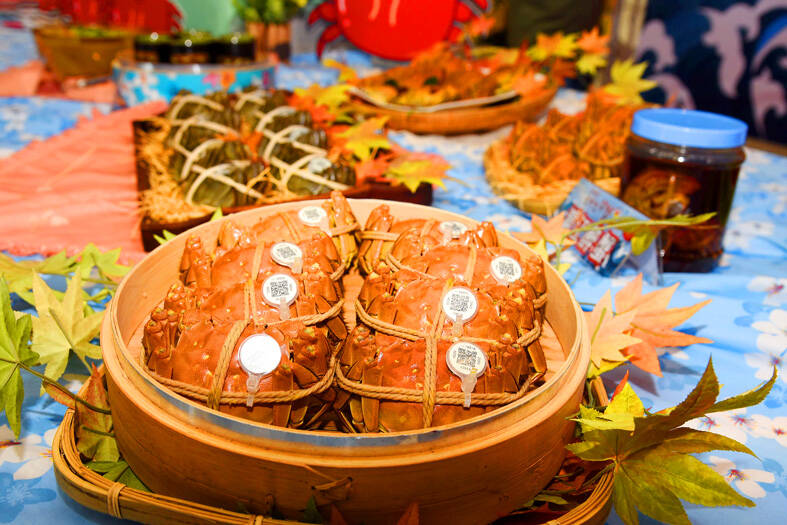China was the country of origin for most food imports that failed inspections over the past two years, accounting for more than one-quarter of all failures last year, Food and Drug Administration (FDA) data showed.
No other country came close to the number of failures, with most of the offending products from China containing hazardous substances such as carcinogens and other toxins, the data showed.
Last year, 628 shipments were flagged, of which 167, or about 27 percent, came from across the Taiwan Strait, the FDA said.

Photo courtesy of the Miaoli County Government via CNA
Out of the 863 flagged shipments in 2021, 167 came from China, or about 19 percent.
In 2021, about 21.9 percent of all imports, in monetary terms, came from the US, followed by 7.3 percent from China, 6.9 percent from Brazil and 5.6 percent from Japan, Council of Agriculture data showed.
Most of the failures were due to pesticides and additives exceeding standards.
Six pesticide residues exceeding safe levels were detected in a shipment of jasmine flowers from China in December last year, including some chemicals that are banned in Taiwan.
One pesticide exceeded safe levels by more than 58-fold, the data showed.
If consumed, the harmful chemicals could accumulate in the body, damaging the liver and kidneys or causing hormonal imbalances or neurological issues, the FDA said.
Some failed imports contained heavy metals, carcinogens and toxins such as aflatoxin produced by certain molds.
A shipment of Chinese mitten crabs was found to contain dioxins, which the WHO’s Web site says belong to the “dirty dozen” category of dangerous chemicals known as “persistent organic pollutants.”
Some inspections failed for containing types of veterinary drugs banned in other countries, while some food packaging was flagged for containing excessive heavy metals, which could be released when the food is heated, the FDA said.
Imports of lion’s mane mushrooms have failed inspections repeatedly in the past two years, and after many shipments of the mushrooms were found to contain excessive pesticide levels, imports were banned for one month, it said.
The agency has requested written responses and plans to rectify failures from offending exporters, including those related to lion’s mane mushrooms and plastic packaging from China, strawberries from Japan, avocados from the US, cherries from Chile and instant noodles from Vietnam, FDA Food Safety Division Acting Director Cheng Wei-chih (鄭維智) said.
Products that highly exceeded standards or contained particularly dangerous substances are checked more frequently, Cheng said, adding that a temporary ban would be implemented if necessary.
Japan was the second-largest exporter of products that failed inspections over the past two years.
Last year, 92 out of 628 flagged shipments were from Japan, or 15 percent, while in 2021, 144 out of 863 were from Japan, or 17 percent.
Japanese strawberries fail inspections almost every week during the peak season, the FDA said.

Three Taiwanese airlines have prohibited passengers from packing Bluetooth earbuds and their charger cases in checked luggage. EVA Air and Uni Air said that Bluetooth earbuds and charger cases are categorized as portable electronic devices, which should be switched off if they are placed in checked luggage based on international aviation safety regulations. They must not be in standby or sleep mode. However, as charging would continue when earbuds are placed in the charger cases, which would contravene international aviation regulations, their cases must be carried as hand luggage, they said. Tigerair Taiwan said that earbud charger cases are equipped

Foreign travelers entering Taiwan on a short layover via Taiwan Taoyuan International Airport are receiving NT$600 gift vouchers from yesterday, the Tourism Administration said, adding that it hopes the incentive would boost tourism consumption at the airport. The program, which allows travelers holding non-Taiwan passports who enter the country during a layover of up to 24 hours to claim a voucher, aims to promote attractions at the airport, the agency said in a statement on Friday. To participate, travelers must sign up on the campaign Web site, the agency said. They can then present their passport and boarding pass for their connecting international

WEATHER Typhoon forming: CWA A tropical depression is expected to form into a typhoon as early as today, the Central Weather Administration (CWA) said yesterday, adding that the storm’s path remains uncertain. Before the weekend, it would move toward the Philippines, the agency said. Some time around Monday next week, it might reach a turning point, either veering north toward waters east of Taiwan or continuing westward across the Philippines, the CWA said. Meanwhile, the eye of Typhoon Kalmaegi was 1,310km south-southeast of Oluanpi (鵝鑾鼻), Taiwan’s southernmost point, as of 2am yesterday, it said. The storm is forecast to move through central

Taiwan sweltered through its hottest October on record, the Central Weather Administration (CWA) said yesterday, the latest in a string of global temperature records. The main island endured its highest average temperature since 1950, CWA forecaster Liu Pei-teng said. Temperatures the world over have soared in recent years as human-induced climate change contributes to ever more erratic weather patterns. Taiwan’s average temperature was 27.381°C as of Thursday, Liu said. Liu said the average could slip 0.1°C by the end of yesterday, but it would still be higher than the previous record of 27.009°C in 2016. "The temperature only started lowering around Oct. 18 or 19